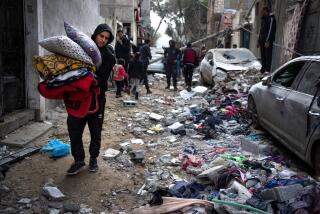Seek Help in Iraq -- Now
- Share via
When President Bush holds his first formal press conference of the year this evening, he must come with a plan in hand. After meeting Monday in Crawford, Texas, with Egyptian President Hosni Mubarak, who expressed his apprehensions about Iraq, Bush reiterated that he would not permit a “small percentage” of insurgents to decide the fate of the Iraqi people. Unless backed by a strategy that brings in the United Nations and Arab countries, this presidential resolve will not prevent disaster for Iraq and the U.S.
April is fast becoming the deadliest month in Iraq since the war started, with at least 70 U.S. troops killed in hostile action so far. -- There have also been numerous kidnappings of foreigners. Negotiations with Shiite insurgents to avoid bloody block-by-block fighting are an acknowledgment of critics’ worst fears. According to the police chief in the city of Najaf, local officers have apparently reached a deal with the militia of Shiite cleric Muqtada Sadr to return to their posts in Najaf. Some U.S.-trained police have defected to Sadr’s ranks, prompting the top commander of U.S. forces in the Middle East, Gen. John Abizaid, to acknowledge, “we’ve got to work on the Iraqi security forces.”
The occupation coalition is also deeply at risk. Vice President Dick Cheney, in Japan for a round of meetings with Prime Minister Junichiro Koizumi, is pleading with him not to yield to rising domestic pressure to withdraw troops.
Bush’s overriding aim must be to offer Iraqis, Americans and partners like Japan a clear plan for political progress in Iraq. Bush has held to a June 30 deadline for transferring governmental power to Iraqis. But until he explains who will take power, the “handover” will be little more than a tightly guarded show of pomp.
A chief aim should be to draw into the discussion Iraq’s top Shiite cleric, Grand Ayatollah Ali Sistani. He is a relative moderate who could help forge a deal among Kurds, Shiites and Sunnis that would have some hope of success. Sistani has pushed for a quick return to Iraqi sovereignty and condemned both U.S. occupation forces and Sadr’s militias. Without his active backing, no constitution or government will survive.
Bush must explain tonight how he intends to involve the U.N., NATO and Arab countries to help police Iraq and rebuild its political institutions. More U.S. troops indeed may be needed in Iraq, if only to create a situation secure enough to allow the U.N. to consider returning. But the troops themselves are not a solution. As U.S. military officials increasingly warn, until the occupation gains international legitimacy, one uprising could simply follow another.
The unilateralism in which Bush placed so much faith has brought him to this dead end. If he fails to ask for help forthrightly and unconditionally tonight -- or in a separate speech very soon -- the message will be clear, even if it’s not the one he wishes to convey.
More to Read
Sign up for Essential California
The most important California stories and recommendations in your inbox every morning.
You may occasionally receive promotional content from the Los Angeles Times.













